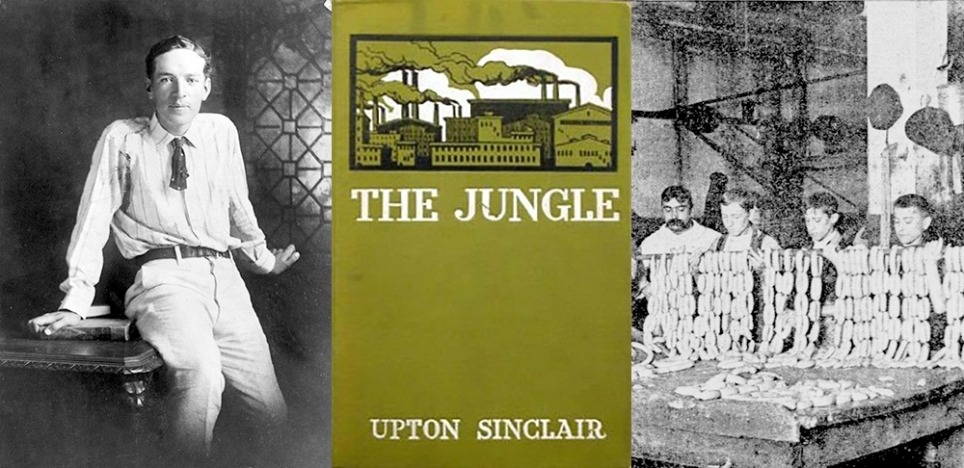On this day in 1878, prolific American novelist, polemicist, and socialist Upton Sinclair was born in Baltimore, Maryland. He grew up with an alcoholic father, whom he considered to be an abject failure, and a strong-willed mother, whose well-to-do relatives gave him an experience of wealth even while his immediate family struggled with poverty.
When he was not quite 14 years old, Sinclair entered what is now City University of New York, paying his tuition by writing for boys' weekly and pulp magazines. He then completed graduate studies at Columbia University, making him one of the best-educated writers of his day. At 20, he vowed to give up hack writing and turned to serious novels. He was unsuccessful until his socialist contacts sent him to Chicago to investigate the meatpacking industry and the dismal fate of its workers.
Sinclair's resulting novel, The Jungle, first appeared in a socialist newspaper, Appeal to Reason. The print revolution was allowing magazines and newspapers to expand their readership exponentially, while at the same time reporters were visiting burned-out tenements and industrial workplaces, exposing the corruption that led to horrific living and working conditions. These crusaders, many of them key literary figures, became known as "muckrakers" as they exposed filthy scandals to millions of readers. What appeared in print now had real clout.
The Jungle went on to be translated into 17 languages. Sinclair intended it to generate outrage about working conditions, but instead what raised people's ire were his descriptions of grotesquely unsanitary meatpacking methods. "I aimed at the public's heart," he said, "and by accident I hit it in the stomach." Nonetheless, the outrage and the resulting increase in government inspection eventually led to Congress passing the Pure Food and Drug Act in 1906.
Although Sinclair is most famous for writing The Jungle, he won the Pulitzer Prize for Fiction in 1943 for Dragon's Teeth, about the rise of Nazism in Germany. All in all, he wrote some 90 books in 90 years.
To Name This Day . . .
 Quotes
Quotes
Bearing in mind that muckrakers wrote with the intention of speaking the truth so that deserved outrage could arise, pick one of these quotes to study today. How have the conditions that caused Sinclair to write the passage you chose changed? What similarities do you see with conditions today?
"These rats were nuisances, and the packers would put poisoned bread out for them: they would die, and then rats, bread, and meat would go into the hoppers together. This is no fairy story and no joke … there were things that went into the sausage in comparison with which a poisoned rat was a tidbit."
― Upton Sinclair, The Jungle
“One could not stand and watch very long without being philosophical, without beginning to deal in symbols and similes, and to hear the hog-squeal of the universe. ... Each of them had an individuality of his own, a will of his own, a hope and a heart's desire; each was full of self-confidence, of self-importance, and a sense of dignity. And trusting and strong in faith he had gone about his business, the while a black shadow hung over him, and a horrid Fate in his pathway. Now suddenly it had swooped upon him, and had seized him by the leg. Relentless, remorseless, all his protests, his screams were nothing to it. It did its cruel will with him, as if his wishes, his feelings, had simply no existence at all; it cut his throat and watched him gasp out his life.”
― Upton Sinclair, The Jungle (concerning the fate of hogs)
“In the year 1819 an act of Parliament was proposed limiting the labor of children nine years of age to four-teen hours a day. This would seem to have been a reasonable provision, likely to have won the approval of Christ; yet the bill was violently opposed by Christian employers, backed by Christian clergymen. It was interfering with freedom of contract, and therefore with the will of Providence; it was anathema to an established Church, whose function was in 1819, as it is in 1918, and was in 1918 B. C., to teach the divine origin and sanction of the prevailing economic order.”
― Upton Sinclair, The Profits of Religion
“Say the very simplest and most obvious things, say them as often as possible, and put into the saying all the screaming passion which one human voice can carry — that was Adolf Hitler's technique. No matter whether it was true or not — for (Hitler) meant literally his maxim that the bigger the falsehood, the easier to get it believed; people would say you wouldn't dare make up a thing like that. Imagine the worst possible about your enemies and then swear that you knew it, you had seed it, it was God's truth and you were ready to stake your life upon it — shout this, bellow this, over and over, day after day, night after night ... when ten million join in it becomes history.”
― Upton Sinclair, Dragon's Teeth
 Spiritual Practice
Spiritual Practice
“Do not let other people invade your personality," wrote Sinclair in World's End. "Remember that every human being is a unique phenomenon, and worth developing. You will meet many who have no resources of their own, and who will try to fasten themselves upon you. You will find others eager to tell you what to do and think and be. But it is better to go apart and learn to be yourself."
Take 5 - 10 minutes today to ask in what ways you are being true to yourself, chiseling a personality that reflects your most deeply held values.
